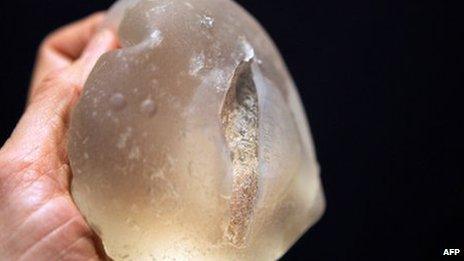Cosmetic surgeons call for surgery adverts ban
- Published
- comments

The PIP implants were made with low-grade silicone not meant for medical use
Cosmetic surgery advertising should be banned and annual checks carried out on surgeons, the industry has said.
The British Association of Aesthetic Plastic Surgeons (Baaps) wants measures including increased regulation of the "cowboy" market in the UK.
Prof Sir Bruce Keogh is leading a government review of the trade after the PIP breast implants scandal.
Sir Bruce has said an insurance scheme for the sector, similar to that in the travel industry, could be introduced.
'Marketing gimmicks'
The government is also considering the introduction of a breast implant registry to make a record of all cosmetic operations.
Baaps said cosmetic surgery as a medical procedure should not be advertised, in the same way that the promotion of prescription medicines is banned.
Baaps president Fazel Fatah said: "Over the last decade the Baaps has worked tirelessly to educate the public on the many aggressive marketing gimmicks that not only trivialise surgery but endanger the patient.
"We have warned against the unrealistic expectations set by reality 'makeover' shows and against crass competition prizes promising 'mummy makeovers' and body overhauls.
"In no other area of surgery would one encounter Christmas vouchers and two-for-one offers - the pendulum has swung too far, and it is time for change.
"Thus we are delighted with the upcoming inquiry and put forward our realistic and achievable proposals for consideration by the government."
'Patient welfare'
The Independent Healthcare Advisory Services represents the cosmetic surgery industry.
Its director Sally Taber told the ¬ιΕΙΙΌΆχ Ή“≥»κΩΎ that "this type of advertising has increased to an inapproprate level".
However, she added: "We do not agree that there should be a total ban on cosmetic surgery advertising.
"Advertising should be honest and ethical, in everybody's interests so the patient is aware of what is available.
"We have worked hard with Baaps to ensure there isn't this incentivised advertising."
The faulty implants were made by the now-closed French company Poly Implant Prostheses (PIP) and filled with industrial rather than medical grade silicone.
Some 300,000 of the implants were sold around the world, mainly in Europe.
About 40,000 women in the UK received PIP implants, with 95% dealt with by private clinics.
The government has said implants given on the NHS can be removed and replaced free of charge, and removed but not replaced if it was done privately.
Private clinics have varied in their response to whether they will remove the implants for free.
NHS medical director Sir Bruce said: "I am working with experts from the plastic surgery field to look at what we can do to make sure people who choose to have cosmetic surgery and other cosmetic procedures are safe.
"I will be looking at all aspects of regulation, at the regulation of implants and fillers, at whether the people who carry out cosmetic interventions have the right skills, at whether the clinics look after the care and welfare of their patients."
- Published20 January 2012
- Published15 January 2012
- Published14 January 2012
- Published14 January 2012
- Published10 December 2013